The Cadillac Three's Jaren Johnston on Nashville roots, low-end lap steel and Taylor Swift
Taking a chainsaw to country music…
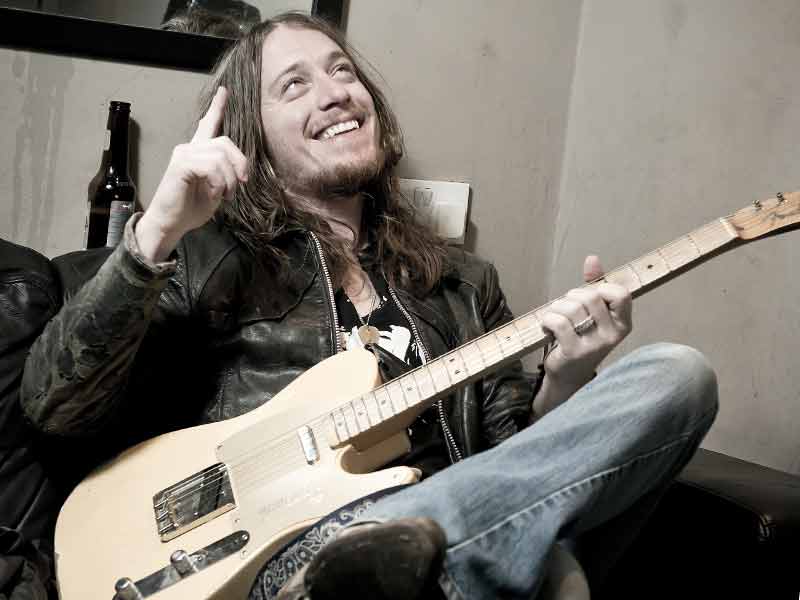
Cadillac Three's Jaren Johnstone on Nashville roots, low-end lap steel and Taylor Swift
Formed out of the fallout from previous band American Bang – a group torn apart by label interference – Nashville’s Cadillac Three swore to never again let themselves be manipulated by outsiders.
Instead, the three remaining members – guitarist Jaren Johnston, drummer Neil Mason and lap steel player Kelby Ray – reconvened in a garage, recorded their debut record, Tennessee Mojo, in just five days and then hit the road.
Now the Southern trio are in the unlikely position of being able to play to a packed-out tent at Sonisphere and hang out with the world’s biggest pop star.
Tours with everyone from ZZ Top to Mötley Crüe ensued before the trio’s metalled-up approach to outlaw country – plus Jaren’s sideline in writing hits for Nashville stars – won them the attention of one Scott Borchetta, better known as the industry svengali behind Taylor Swift.
Now the Southern trio are in the unlikely position of being able to play to a packed-out tent at Sonisphere and hang out with the world’s biggest pop star. We spoke to Jaren about his Nashville roots, low-end lap steel and just what he has in common with Taylor Swift.
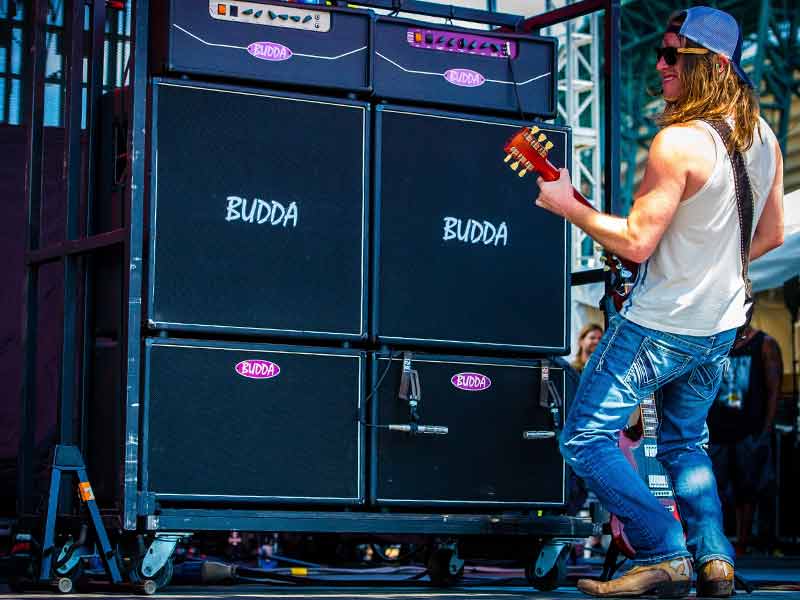
Nashville forever
As a band, you make a point of noting your Nashville heritage. How does hailing from Nashville affect your sound?
“I think it’s definitely something you hear – you hear The South in us; whether that’s Nashville or not, I don’t know. I think a lot of times these days it’s perceived, at least in the States, as straight country.
"There’s a lot of stuff that comes out of Nashville, a lot of gospel, a lot of big country, and a lot of playing by the rules. We’re real proud to be representing something different from Nashville – not just country, not just rock. I think it’s good for us and for Nashville.”
Country music is such a broad term. What does it mean to you?
“Country is weird because I’m involved in so many sides of it. There’s what we do, whether you want to call it country – in the States, or here I think you’d just call it rock – but I think it’s a hybrid.
"Then, to me, it means old country: Hank Williams, Don Williams, Hugh Willy, Clint Black, Garth Brooks – stuff that was around when I was a kid and I was immersed in it, because my parents were in the business.
"These days, it has changed. It’s very pop-orientated and it’s laced with people just trying to make it ‘country’, you know?”
Your father played drums on the Grand Ole Opry. What do you recall about the show?
“It’s like your version of Whispering Bob Harris’s show. It’s huge. I grew up going there as a kid, watching him do it and watching all of the greats do it. Dad would bring me along because it was cheaper than having a babysitter and I loved it there.
"He’d just turn me loose backstage. It was a lot – anywhere from five to 11 years old – and it was a very influential time in my life. You were walking around backstage and seeing Garth Brooks play for the first time and falling in love with that whole thing…”
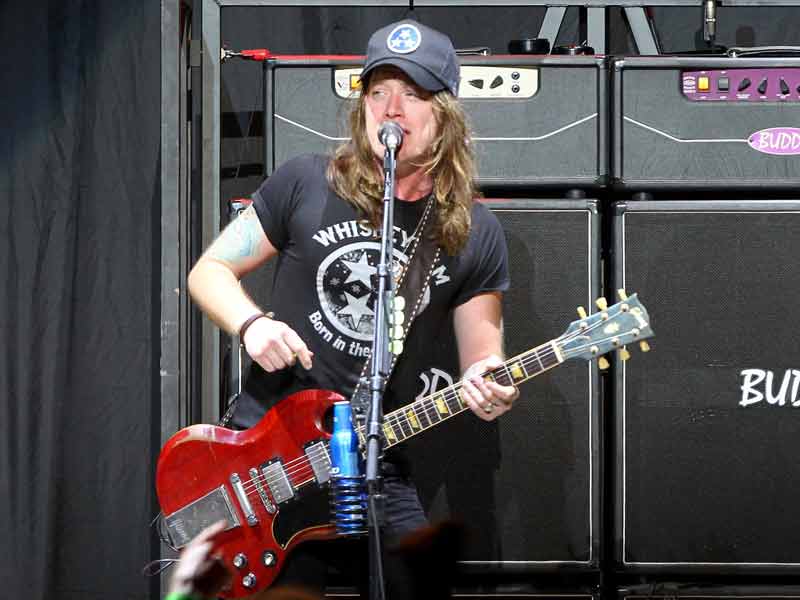
Metal, deals and independence
Bands such as Rage Against The Machine and Metallica were big influences on you, too. How did they come into your life?
“Well, all of the country stuff was when I was younger, then you get into your angst-ridden pubescent years and you’re all ‘fuck the world!’ I was 13 or 14 years old and I just so happened to get an electric and an acoustic guitar for Christmas – a pink Kramer and a nylon-string Epiphone classical acoustic.
"You get into your angst-ridden pubescent years and you’re all ‘f**k the world!’"
I would sit with that classical guitar and pick out songs off Nevermind. Then, once I got the little amp for the electric, I would go through Rage Against The Machine riffs, like Bombtrack.
"I would eat up riffs like that. That, with all of the country stuff beforehand, kind of melded into this one weirdo!”
Speaking of metal, you played Sonisphere festival last summer. How did that go?
“It was Sunday at noon! We flew 30 hours to get here, got in at 9am and played at noon. We weren’t that excited about that spot, because we thought, ‘Everybody’s hungover. Iron Maiden played the night before. Everybody was probably hammered drunk…’
"But we got up there and the stage hands were like, ‘Dude, we’ve never seen so many people here for a noon on Sunday slot!’ There were five or six thousand people singing every word.
"It was at that point that we knew something was kind of happening over here.”
You’re signed to Scott Borchetta’s Big Machine label, home of Taylor Swift. Do you think it’s still possible to be outlaw country-types with that team behind you?
“Well, Waylon Jennings, Hank Williams Jr, Willie Nelson, Kris Kristofferson, all these fucking guys had record deals. It’s part of it.
"With us, we just have to stand our ground. I’d quit before we did something we didn’t want to do, because we’ve been through that already and, honestly, I make a pretty fucking good living writing songs.
"We’re out here to do this for fun. If we were in it for the money, we would have quit a long time ago!”
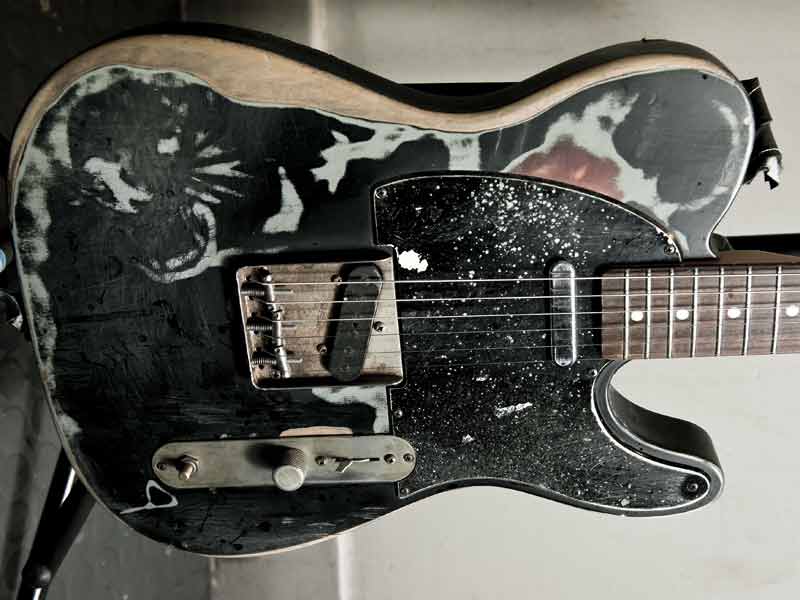
Taylor Swift, gear, low-end lap steel and JD
So, besides a label, what do you have in common with Taylor Swift?
“She is a sweetheart, by the way. Her and I have a lot in common, because she writes a lot herself and I do, too. Most people in country don’t.
"Listening to her writing, she’s putting herself out there. It’s hard to do that, especially as she was 14 when she started up all this shit.
"When I was 14 I was popping zits, running on a skateboard and learning how to play drums: I was not together!
“I admire what she’s done and what Scott and them have built around her. I mean, shit, she sold like 1.3 million copies [of 1989] in the first week – in a world where nobody’s selling anything! That’s impressive. And, for us, you want someone behind you like Scott that’s got balls and is not afraid to take a chance.”
What kind of gear do you use?
“I’m really into the Fender Joe Strummer Telecasters. I bought five or six of them and I found them on eBay and I added my little Hot Rails pickup situation to a couple of them, which makes them sound more like an SG. I ran across one and just thought, ‘Fuck, that is so cool-looking…’
"I’m really into the Fender Joe Strummer Telecasters. I bought five or six of them"
"That’s what turns you on at first, so I bought one and played it, and it came with some really hot pickups and I loved it. So then every time I saw one come up on eBay, I bought them.
"I use a couple of SGs as well. I have a Gibson endorsement, so they give me a couple of those.
"Then I use Budda Amps. I’ve been using them for about two years. I love their cabinets and the souped-up heads. I don’t even know what the number is, I just turn that shit up.
"It’s great, it’s real boxy. Though, the other night, I ran it through a Marshall Greenback and it was pretty sick, so I’ve started thinking I might have to do that.”
How do you fill in the low end without a bass player?
“Kelby does it on the lap steel. He runs two channels and runs it through a frequency divider, so one channel’s got a volume pedal that goes to a bass amp and then the other channel’s got a volume pedal that goes to a Budda.
"He can run them separately, or if he puts them both down, he can run them both at the same time from the lap steel. It just picks up the bottom two strings for the bass.”
Whiskey is one of your favourite topics, lyrically. What are the most memorable situations that you can attribute to it?
“I’m actually off whiskey right now, because of situations like that! We go so hard and, especially now we have a bus in the States, you don’t really have to stop partying, so it’s tough to put the bottle down. What’s great about whiskey is that it was the one thing between all three of us guys, wherever we were, whether we were in a van with all the gear in the back, freezing cold, sleeping in a Walmart parking lot, or in a huge packed-out club, we could all sit down with Jack Daniels and we’d all be happy for that five minutes! It’s a big thing for us and it’s a Southern heritage thing you grow up with. It’s what I drank, it’s what my dad drank. It’s fun to sing about, too, and I only have a couple of tricks!”
Jack Daniels, the fourth member of The Cadillac Three…
“Ha! Yeah, The Cadillac Four…”
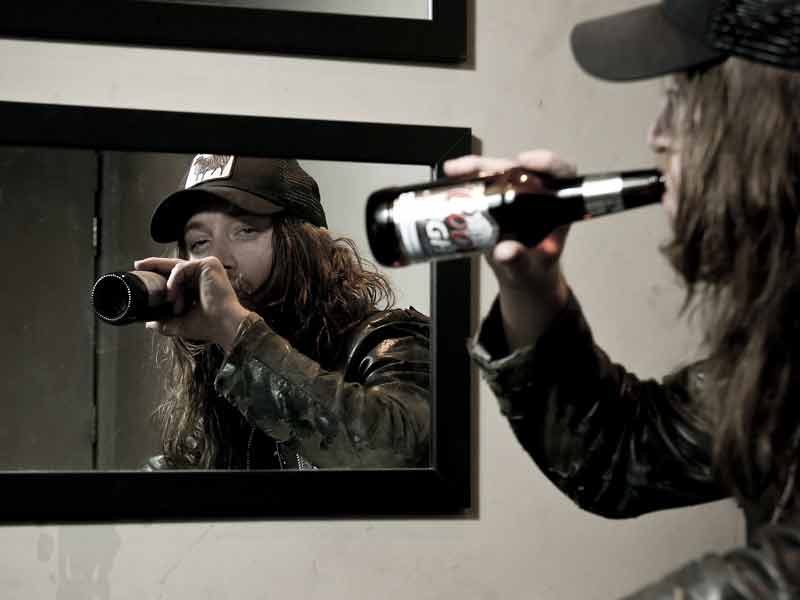
Gun for hire
When not steering The Cadillac Three, Jaren is a Grammy Award-winning songsmith to some of Nashville’s biggest names, including Tim McGraw and Keith Urban.
“I was always enamoured by the art of the songwriter: developing a story and putting it to a melody, andI thought that if I could make money doing it then that would be cool, too!
"Write as many songs as you can with as many people as you can and learn something each time"
"I just sit down and write, and sometimes it’ll end up being a Cadillac Three song and sometimes it takes a different alley and I’ll think, ‘Oh, this would sound good if Keith Urban sung it…’
“[The key for beginners is to] write as many songs as you can with as many people as you can and learn something each time. There were years where I wrote 500/600 songs in a year and maybe 10 were good.
So just write as much as you can and you will start getting there.”
Matt is a freelance journalist who has spent the last decade interviewing musicians for the likes of Total Guitar, Guitarist, Guitar World, MusicRadar, NME.com, DJ Mag and Electronic Sound. In 2020, he launched CreativeMoney.co.uk, which aims to share the ideas that make creative lifestyles more sustainable. He plays guitar, but should not be allowed near your delay pedals.
